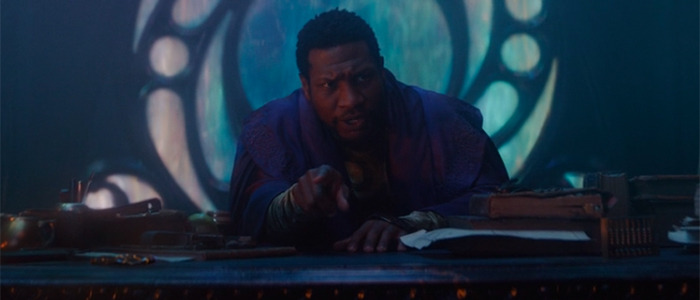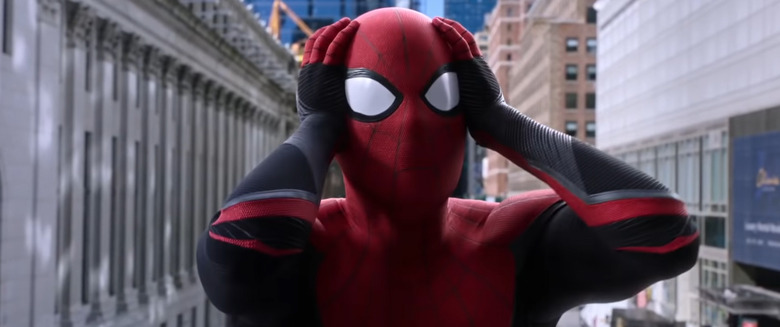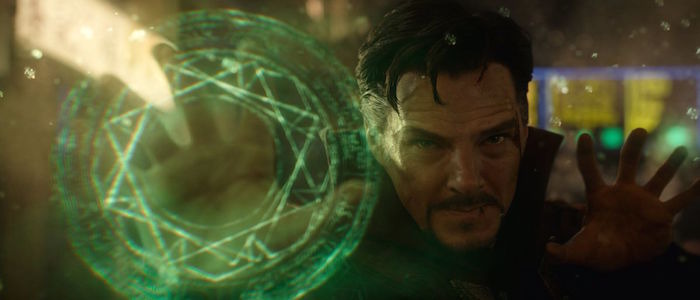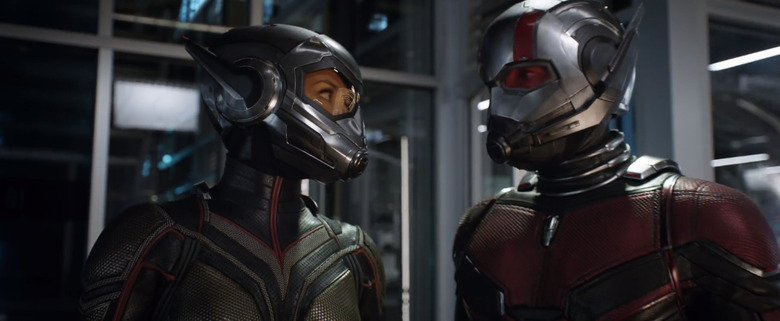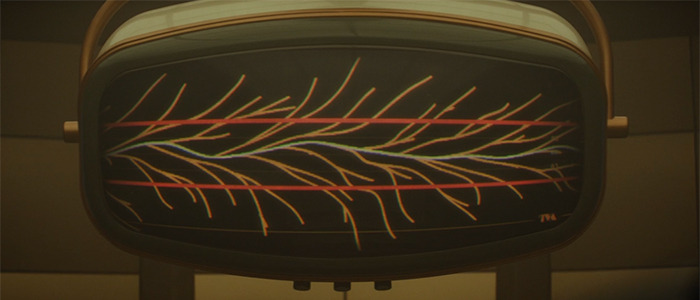How The 'Loki' And 'WandaVision' Finales Set The Stage For The Next Phase Of The MCU
Even though Marvel Studios was forced to take a break from the big screen due to the coronavirus pandemic, it allowed the comic book movie studio to make waves with their new original shows on Disney+. It's almost a blessing in disguise that Marvel's movies were pushed back, allowing WandaVision, The Falcon and The Winter Soldier, and Loki to shine. In fact, the finales of both WandaVision and Loki have set the stage for a huge even that will have repercussions across the entire next phase of the MCU.
The Loki Finale
Before we get into the nitty gritty of how the events of Loki and WandaVision will impact the larger Marvel Cinematic Universe, let's dig into the finale of Loki a little bit.
When Loki (Tom Hiddleston) and Sylvie (Sophia Di Martino) reach the end of time, they meet a character referred to by Miss Minutes as He Who Remains, and he's played by Jonathan Majors. This realization seems to confirm the theories about Kang the Conqueror being behind the Time Variance Authority since Jonathan Majors has already been reported to play Kang the Conqueror in Ant-Man and The Wasp: Quantumania. But it also debunks them in a way.
He Who Remains is really an entirely different character in Marvel Comics. Not only is he the creator of the Time Keepers, but he's also the final director the TVA in the Citadel at the End of Time, which is the last remaining reality of the multiverse. However, it seems that label has now been applied to Kang the Conqueror. Loki gives us a version of He Who Remains, who is a variant of Kang. Though the name is never uttered, the "conqueror" label is briefly mentioned.
Furthermore, He Who Remains warns that his death and the creation of the multiverse will bring about multiple variants of himself. Since Kang the Conqueror is known for conquering timelines, it's safe to assume that all of his variants will be creating trouble across the multiverse. But besides that, the mere creation of the multiverse will pave the way for what's to come in the rest of the Marvel Cinematic Universe.
Spider-Man: No Way Home
Loki has officially paved the way for the multiverse to break open in the Marvel Cinematic Universe, and it looks like the Spider-Man franchise will be the first Marvel Studios movie to feel the aftermath.
We've been hearing for awhile now that Spider-Man: No Way Home will tap into the multiverse by not only bringing in multiple versions of Spider-Man with the return of Tobey Maguire and Andrew Garfield from their respective franchises (despite denials of such a concept), but also the return of villains like Doc Ock (Alfred Molina) and Electro (Jamie Foxx), from what we can now assume will be branded as alternate universes/timelines created by the death of He Who Remains.
In Spider-Man: No Way Home, we've heard that Peter Parker (Tom Holland) seeks refuge in the Sanctum Sanctorum with Doctor Strange after his secret identity was revealed by J. Jonah Jameson (J.K. Simmons) via Mysterio (Jake Gyllenhaal). Joining him are MJ (Zendaya) and Ned (Jacob Batalon), who have been labeled as Spider-Man's accomplices. Without getting into specifics until a trailer is officially revealed, it has been said that Peter Parker stumbles upon something in the Sanctum Sanctorum that will put him on a path to discovering the effects of the multiverse that was only previously teased as a lie told by Mysterio.
Spider-Man: No Way Home arrives on December 17, 2021.
Doctor Strange in the Multiverse of Madness
Since Doctor Strange (Benedict Cumerbatch) will be part of Spider-Man: No Way Home, we're assuming the events of the webslinger's sequel will also plant the seeds for whats to come in Doctor Strange in the Multiverse of Madness. Though what unfolds in No Way Home will clearly be focused on how the multiverse impacts Peter Parker, the events of that movie will likely signal a bigger problem that Doctor Strange will have to deal with in his own sequel. And the presence of Elizabeth Olsen as Scarlet Witch in that movie may give us an idea of what one of those problems could be.
At the end of WandaVision, a credits scene (which was mysteriously updated recently) showed us Wanda Maximoff living in a cabin deep in the mountains. However, she wasn't just enjoying a much needed getaway. Though Wanda was seen getting ready to enjoy a cup of tea, she was also seen in the form of an astral projection of the Scarlet Witch, reading through the Darkhold book of spells that will help enhance and grow her powerful magical and mystical abilities. But while Scarlet Witch was reading through the Darkhold, she was interrupted by echoes of her children yelling for help. That's especially interesting since it was believed that her twin sons Billy and Tommy were only manifestations of her own magic within The Hex.
Since Elizabeth Olsen has been reported to be a major player in Doctor Strange in the Multiverse of Madness, we're betting a major plot point will be Scarlet Witch trying to track down her kids in another universe. Could a variant of Kang the Conqueror be responsible for holding her kids captive in another universe? Will that be something that triggers the madness of the multiverse, or is it just part of the larger debacle that Doctor Strange is trying to deal with?
Doctor Strange in the Multiverse of Madness is slated for release on March 25, 2022.
Ant-Man and The Wasp: Quantumania
Well, now that we've met one version of Kang the Conqueror in the Loki finale, it only makes sense that we'll meet a variant of him in the upcoming third installment of the Ant-Man franchise. We're not entirely sure what to expect from this one, but there is one detail from Ant-Man and The Wasp that will likely be a key component of the villain's presence in this sequel.
In Ant-Man and The Wasp, when Janet Van Dyne (Michelle Pfeiffer) is rescued from the Quantum Realm by Hank Pym (Michael Douglas), you can see an entire city in the background, implying that there's a whole civilization in this subatomic world. Could a version of Kang the Conqueror be stuck there? Perhaps he's been working on a way to escape, and after being left behind by Janet Van Dyne, maybe he's pissed and wants to take it out on the rest of the world.
Jonathan Majors was already cast as Kang the Conqueror in Ant-Man and The Wasp: Quantumania before Loki premiered, which is why so many theories about the character popping up in the show manifested themselves after the very first episode. What will this version of Kang the Conqueror bring to the table?
Ant-Man and The Wasp is slated to arrive in theaters on February 17, 2023.
Loki and The Future of the MCU
Now that his presence in the MCU has been confirmed, along with plenty of variants across the multiverse, there are endless possibilities for how the villain will have an impact on the next phase of the MCU, and that's exactly what Loki head writer Michael Waldron intended.
Before Loki even premiered, head writer Michael Waldron teased major ramifications for the Marvel Cinematic Universe. Now he's confirmed how Kang the Conqueror fulfills that threat in a conversation with Marvel.com:
"We knew that we wanted this show to be huge, and we wanted it to really end with a bang and have a huge impact on the MCU moving forward. Knowing that Kang was probably going to be the next big cross-movie villain, and because he is a time-traveling, multiversal adversary, it just always made so much sense. I came up with that big multiversal war mythology and pitched it out in the room one day to our producers. And they said, yeah, let's go for it. We knew we were going to end up meeting the man behind the curtain. And then it was just on us to make sure that that meeting really delivered."
Does this make Kang the Conqueror the new Thanos? The villain started out as a looming threat in a credits scene from The Avengers, but the full breadth of his power wouldn't be felt until Avengers: Infinity War. Could we see multiple versions of Kang the Conqueror coming together as the next major adversary for the entire MCU? That seems possible with how Waldron intentionally teased what's to come. The writer said:
"You had to leave a lot of meat on the bone in terms of how evil he could be, because that's He Who Remains' whole thing, that it's not me who you should be afraid of. 'It's the other versions of me that are going to come.' It was trying to really hint at that terrifying evil within without going all the way there."
So instead of giving us a full-on villain, Waldron gave us a version of Kang the Conqueror who was at the end of his rope, tired of ruling over time. But he still wrote the character as a "very charismatic sociopath," hinting at the madness that any of his variants could bring. Imagine how crazy and deadly a version of Kang the Conqueror could be when he's not sick of living for eons.
On a side note, the introduction of the multiverse in this fashion is an interesting way to retroactively make every Marvel movie or TV show every made part of the Marvel Cinematic Universe. Perhaps that's why Marvel's What If...? animated series may have more significant ties to the MCU than we're expecting. Maybe this is how we'll get Tom Holland's Spider-Man to meet Tom Hardy's Venom or even the introduction of the X-Men and Fantastic Four. Literally anything is possible.

